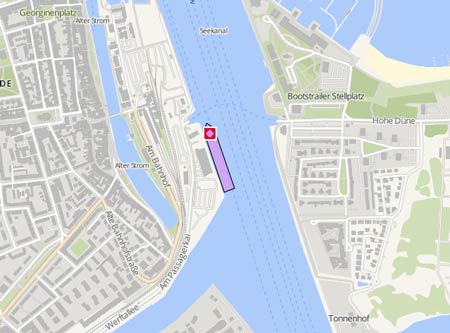CMA CGM B FRANKLIN
Kurs/Position
Die letzten Häfen
Die letzten Wegpunkte
Die neuesten Nachrichten
SAMSA trying to identify ship which lost pharmaceutical bottles
Work to identify a vessel responsible for pharmaceutical bottles washing ashore along the South African east coast from Gqeberha through to nearby north eastern towns on the Indian Ocean coastline, was actively being investigated by the South African Maritime Safety Authority (SAMSA). For identification, analysis and safe disposal of the pharmaceutical products SAMSA said it was working through an Incident Management Systems (IMS) committee involving among others, the Department of Forestry, Fisheries and Environment, South African Police Service (SAPS), Eastern Cape Disaster Management and the South African Health Regulatory Authority (SAHPRA). At South Africa’s Sunshine Coast medicinal products were collected enmasse over the past week, after several cargo vessels traversing this part of the Indian Ocean, lost collectively close on 200 containers within about eight weeks since July 2024 from the 'CMA CGM Benjamin Franklin', 'CMA CGM Belem', 'Maersk Stepnica', 'Rio Grande Express' and 'MSC Antonia'. Iin addition to tracking down the specific vessel on which the consignment of pharmaceutical produces might have fallen from, the SAMSA was also closely monitoring the coastline in collaboration with local authorities to track any further containers or goods that might wash ashore. The SAMSA was aware of the container that washed ashore on the East Coast near Port St Johns and has been informed of pharmaceutical bottles containing pills that have been washing ashore in the Port Alfred, Kenton, Cannon Rocks, and Boknes areas since Sep 9. Efforts were underway to monitor and address any hazards that may arise. SAMSA was currently working to identify the vessel responsible for the pharmaceutical bottles washing ashore. The owners of the vessels were fully cooperating with SAMSA and other relevant authorities and have committed to undertaking clean-up operations along the coastline should any contamination or further cargo loss occur. Report with photos: https://blog.samsa.org.za/2024/09/12/mop-up-underway-of-containers-and-pharmaceutical-bottles-found-on-the-south-african-eastern-coastline-samsa/
Mega-container ship too big for shrinking trans-Pacific route
French shipping line CMA CGM SA will no longer run the vessel Benjamin Franklin — the largest container ship to ever call at U.S. ports — between Asia and the West Coast. The ship was replaced with a smaller vessel, the Leo, less than five months into its service on the trans-Pacific route, according to BlueWater Reporting, which tracks ocean sailing schedules. Representatives for CMA CGM didn’t respond to messages Monday. According to documents on CMA CGM’s website, the Benjamin Franklin is now running a route between Asia and Europe, where larger ships are more commonly used. The Benjamin Franklin can carry nearly 18,000 20-foot containers, or TEUs, marking a capacity record when it docked at the Port of Los Angeles late last year. On a second trip to neighboring Long Beach in February, CMA CGM held inaugural festivities. At the time, CMA CGM founder and Chief Executive Jacques Saadé told the crowd that the company was so confident in the U.S. economy and the demand for freight capacity that the carrier planned to launch six more vessels of the same size on its trans-Pacific “Pearl River Express” route. It soon became clear the extra capacity wasn’t needed on the trans-Pacific lane, where a glut of shipping capacity has driven freight rates to record lows. Source: MarketWatch
CMA CGM Cancels West Coast ULCV Service
CMA CGM has confirmed reports that it will not be deploying ultra-large container vessels like the CMA CGM BENJAMIN FRANKLIN on regular trans-Pacific runs. A spokesman for the line cited the "current trans-Pacific market situation" in comments to the Wall Street Journal. Eastbound trans-Pacific spot rates have fallen to $750-$800 per forty-foot unit, roughly half the rate two years ago. CMA CGM is just starting new a carrier alliance with COSCOCS, OOCL and Evergreen, which will begin operations next year (subject to regulatory approval). At least one of these partners – OOCL – has already seen revenue suffer in recent months despite increasing volume, thanks in part to falling rates on oversupplied Asia-U.S. West Coast routes. The addition of six 18,000 TEU vessels calling at Los Angeles / Long Beach would have made the overcapacity problem worse for carriers and alliances, analysts said.
News schreiben

